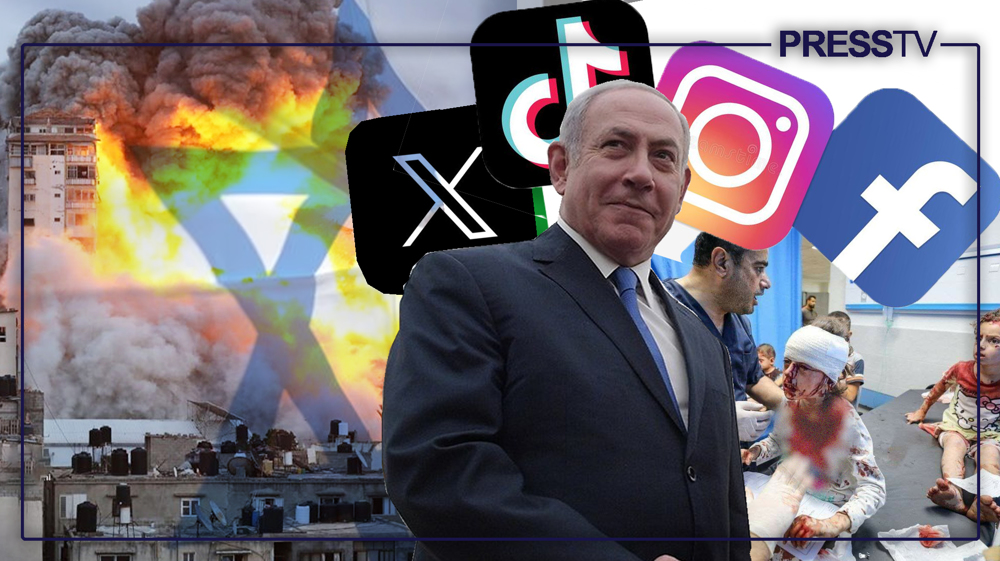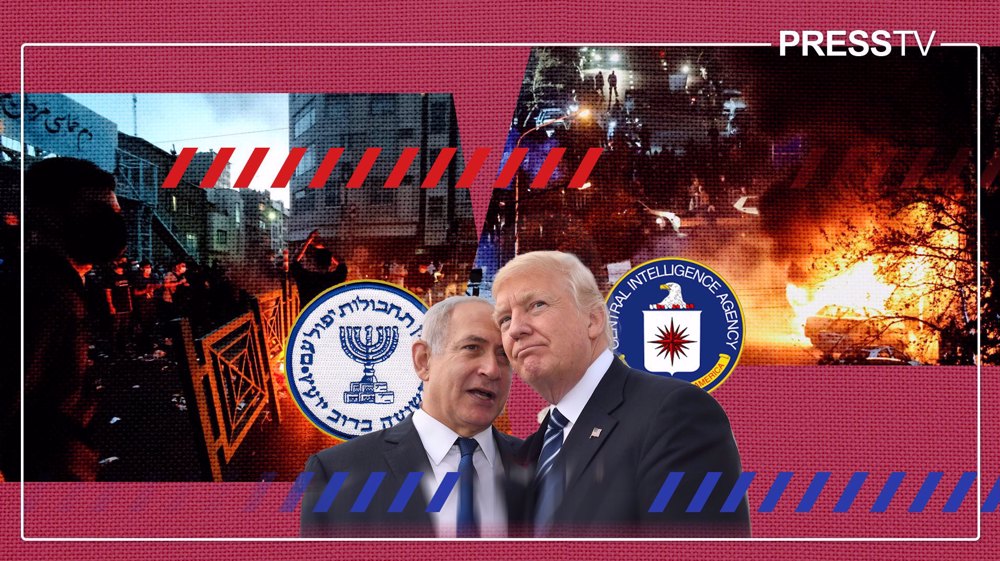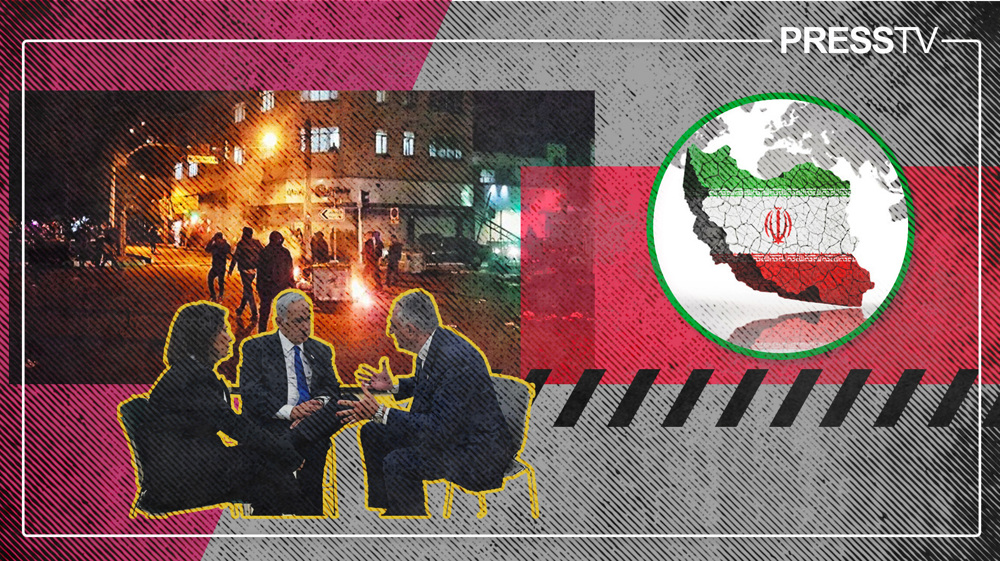How social media platforms are suppressing, censoring pro-Palestine content
By Maryam Qarehgozlou
In yet another example of censorship, the ‘Eye on Palestine’ page on Instagram with more than 6 million followers has been taken down for sharing and amplifying content in support of the people of Palestine.
Social media users on Thursday expressed shock and anger over the decision taken by Meta, Instagram’s parent company, accusing the company of censoring content critical of the Israeli regime.
It comes as Israeli warplanes continue to pound the densely-populated civilian areas of the besieged coastal territory, including hospitals and places of worship, with most casualties including children.
The removal of the ‘Eye on Palestine’ page comes after the widely followed Instagram page of Palestinian photojournalist Motaz Azaiza was restricted by the Mark Zuckerberg-led company.
Azaiza had been sharing the harsh on-ground reality of the Israeli carpet bombing of the Gaza Strip since October 7 when the campaign began following the Hamas-led ‘Al-Aqsa Storm’ operation.
The Palestinian resistance operation was in response to relentless atrocities against Palestinians in both Gaza and the occupied West Bank as well as the recurrent desecration of the al-Aqsa Mosque.
Azaiza, who had nearly 8 million followers on Instagram, was updating his followers on the horrific aggression the regime in Tel Aviv unleashed on the besieged territory.
On October 12, he posted a video of the aftermath of an Israeli bombardment that killed at least 15 of his family members, most of them women and children.
Meta, which owns Facebook, Instagram and WhatsApp, restricted his account in response.
Following users’ backlash, Instagram reinstated Azaiza’s account a day later.
His X account, however, is still suspended, for exposing the Israeli regime’s ghastly war crimes against civilians in the Gaza Strip, rather than violating the platform’s so-called “community guidelines.”
On Sunday, Pulitzer Prize-winning journalist Azmat Khan also announced in a post on X that her Instagram account had been shadow-banned after sharing a story about the Gaza war.
“After posting an Instagram story about the war in Gaza yesterday, my account was shadowbanned. Many colleagues and journalist friends have reported the same,” she wrote.
“It’s an extraordinary threat to the flow of information and credible journalism about an unprecedented war.”
Azaiza and Khan are not the only ones to earn the wrath for exposing the regime’s genocidal campaign through their social media pages. Hundreds of other users have similar experiences to share.
Censorship of pro-Palestine content
Social media users, including journalists, activists, influencers, and even regular users across the world complain that pro-Palestine content is being purposefully censored or demoted.
Popular social media platforms such as X, Instagram, YouTube and TikTok have introduced harsher content moderation rules that are acutely biased against pro-Palestine voices.
The phenomenon of shadow-ban has been in full swing for the past three weeks. Counts of views and likes on posts supporting Palestinians have significantly declined.
Some users have even reported that they cannot broadcast live videos, and posts containing hashtags like “FreePalestine” and “IStandWithPalestine” are also hidden or taken down on the false pretext of violating the companies’ content rules.
A 32-year-old Iranian teacher who requested anonymity told the Press TV website that her Instagram stories in support of Palestine are receiving “significantly” a smaller number of views.
Her Instagram account with almost 900 followers is now unsearchable, and she said according to her followers, her posts are no longer appearing on their Instagram feed.
“I did not post any hate speech or graphic images, my posts and stories only contain developments on the situation in Gaza and I criticize the dehumanization of Palestinians,” she said.
Another user, a 46-year-old Tehran-based university professor, who also asked to remain anonymous, told the Press TV website that his Instagram account had been deactivated without warning.
“I was logged out of my account and Instagram asked me to add a phone number for security, then it said it would review my information for 24 hours, however, my account remained inaccessible.”
He explained that Instagram stated that his account had been disabled for violating community guidelines without any evidence. “I believe that is because of my outspoken support for Palestine.”
Meta and Palestinian content
Dozens of organizations, including 7amleh, the Arab Center for Social Media Advancement, and a Palestinian digital rights non-profit have in recent weeks urged social media companies to not censor Palestinian content given the situation that is unfolding in the Gaza Strip.
“We are [concerned] about significant and disproportionate censorship of Palestinian voices through content takedowns and hiding hashtags, amongst other violations,” 7amleh said in a statement.
“These restrictions on activists, civil society and human rights defenders represent a grave threat to freedom of expression and access to information, freedom of assembly, and political participation.”
In a statement on October 13, Meta said it never intended to “suppress a particular community or point of view,” the content may have been removed “in error” due to “higher volumes of content being reported” surrounding the Israeli aggression in Gaza.
It also blamed the reduced reach of some content and the lower engagement on glitches in its algorithmic moderation, attributing the problem to a “bug.”
“This bug affected accounts equally around the globe and had nothing to do with the subject matter of the content - and we fixed it as quickly as possible,” the company claimed.
But many social media users are skeptical of Meta’s explanation, as last week Instagram began adding “Palestinian terrorist” to the bio of some users.
Instagram’s auto-translate tool translated “Palestinian” followed by the Arabic phrase “alhamdulillah” meaning “Praise be to Allah” in English to “Palestinian terrorists” in multiple profiles.
In a statement, a Meta spokesperson again blamed the issue on a “glitch” and said the issue was fixed.
“We fixed a problem that briefly caused inappropriate Arabic translations in some of our products. We sincerely apologize that this happened,” the spokesperson said.
However, a former Facebook employee who spoke to the Guardian anonymously for fear of retaliation said the issue “really pushed a lot of people over the edge” – internally and externally.
“You cannot keep blaming it on glitches when it’s spreading misinformation and dehumanizing Palestinians by feeding into the narrative that all Palestinians are terrorists,” he noted.
Evading censorship
The platforms also have a history of inherent bias in favor of the Israeli regime.
In May 2021, Facebook came under fire after it reportedly removed hundreds of pro-Palestine posts, without providing any explanations, during Isarel’s 11-day bombardment of Gaza.
The 7amleh documented nearly 500 removals on Instagram and Facebook between May 6 and 19.
At the time, a Facebook spokesman said this was not a deliberate suppression of pro-Palestine voices, but some “glitches” affected the ability to share content on Facebook and Instagram, including an error that temporarily restricted content from being viewed on the al-Aqsa Mosque hashtag page.
Attributing such moves to glitches on all occasions is what the social media users and digital rights advocates do not buy anymore, who describe the disproportionate content moderation against pro-Palestine voices as a blatant violation of rights.
The targeted censorship of Palestinian voices is designed to hide the accurate, first-hand information on the gruesome reality of Israeli aggression on Gaza especially at a time when Western mainstream media outlets are conveniently reluctant to cover events on the ground in Palestine, say activists.
Nonetheless, users are increasingly finding workarounds to evade the algorithm by inventing code words and special spellings known as “algospeak.”
Some say they swap letters, for example, use “@” instead of “a” or “3” for “e” when spelling words like “Israel” (Isr@3l) and “Palestine” (P@l3stin3).
Some other users break words with dots or slashes to trick big tech’s content rules so that their posts are not removed or suppressed by social media companies.
“Social media can play an essential role in exposing Israel’s war crimes in the Gaza Strip and to fight against the disinformation campaign and anti-Palestine propaganda which aim to justify the regime’s genocidal campaign across the occupied territories and the besieged Gaza,” said Kaveh, an avid social media user and digital rights activist.
EU Parliament halts US trade deal after Trump tariff threat
VIDEO | An unchecked presidency
VIDEO | Deportations strain Afghanistan’s fragile economy
‘Full-scale atrocity’: Iran security body reports 2,427 martyrs in US-Israeli-led riots
Smallest coffins are the heaviest: The three youngest victims of foreign-backed riots in Iran
Hamas warns of ‘systematic Israeli violations’ as Gaza ceasefire teeters
Israeli strikes kill 11 across Gaza, including children and journalists: Palestinian medics
US forces transferring Daesh prisoners from Syria to Iraq: CENTCOM










 This makes it easy to access the Press TV website
This makes it easy to access the Press TV website